Puppy Tooth Broke: What Should I Do? – Expert Advice and Solutions
As a concerned pet owner, it’s natural to worry when your puppy experiences a dental mishap. Take a deep breath—broken puppy teeth are quite common and usually not as alarming as they might seem. In this article, we’ll explore the steps you should take when your puppy breaks a tooth, and give you some peace of mind along the way.
During the teething process, puppies sometimes break or chip their teeth due to their natural curiosity and tendency to chew on anything they can find. This can include softer toys, like plush animals, or tougher objects such as tennis balls and bones. Understandably, you may be concerned about your furry friend’s health and comfort, but rest assured, there are actionable steps you can take to address the situation.
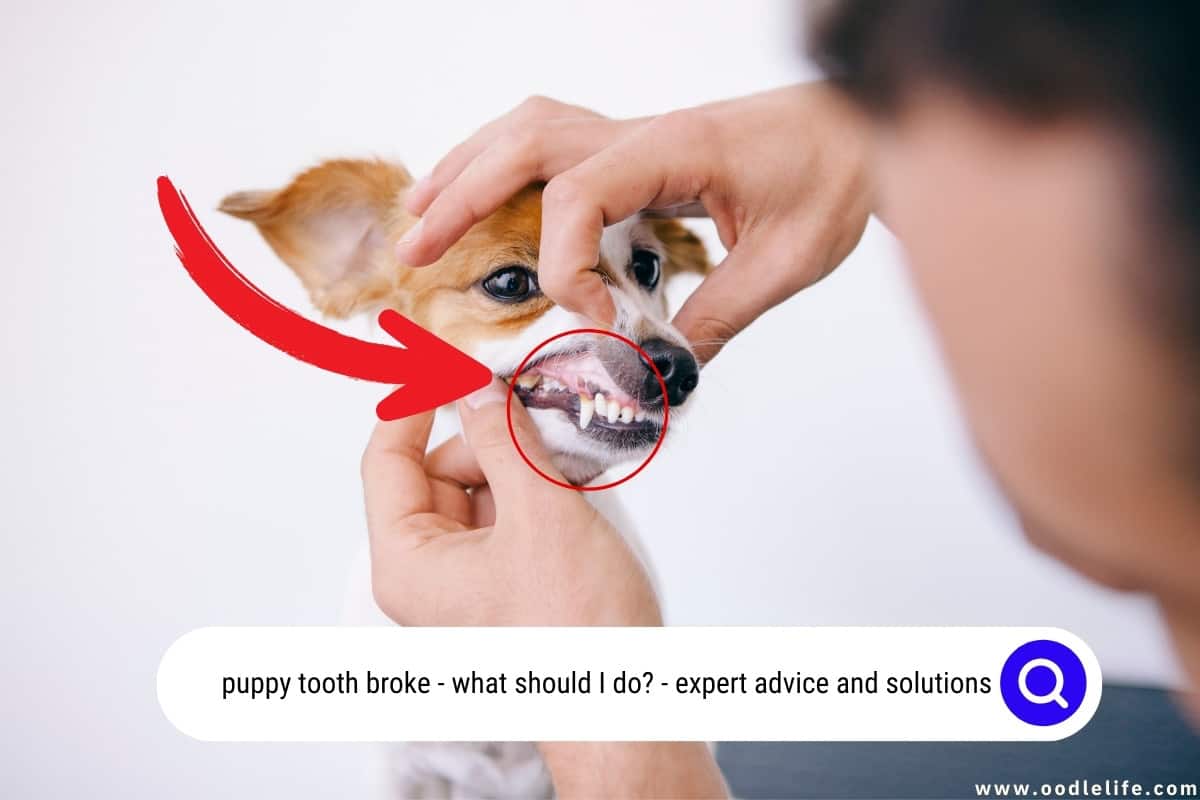
Once you’ve noticed your puppy’s broken tooth, start by examining the affected area to assess the damage. It’s crucial to remain gentle and patient during this step, as your puppy may be in discomfort. Following a thorough inspection, deciding on the appropriate course of action will be key to keeping your puppy healthy and happy.
Let’s discover more on this topic together, focusing on the practical advice and guidance you need in these circumstances.
Understanding Puppy Teeth
When your puppy is growing up, their teeth will undergo several changes. Just like human babies, puppies have baby teeth, also known as deciduous teeth, that start appearing around 3 to 4 weeks of age. By the time they are 8 weeks old, they will typically have 28 baby teeth.
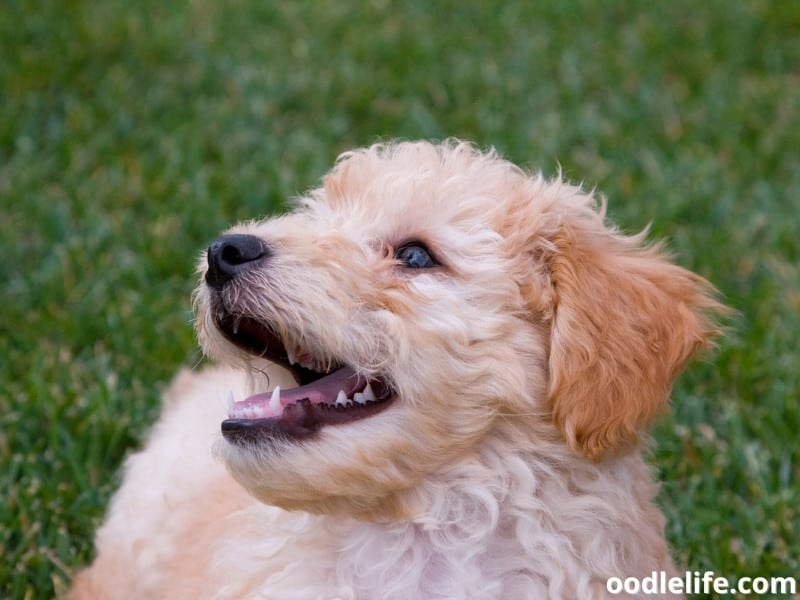
These tiny teeth might look cute, but they are surprisingly sharp – as you may have discovered while playing with your furry friend!
While puppy teeth usually don’t cause problems, sometimes a tooth can break. If you notice a broken tooth in your puppy’s mouth, there’s no need to panic. It’s essential to stay calm and follow some simple steps to deal with the situation.
First things first, provide comfort to your pup and gently examine their mouth. Take note of any bleeding, swelling, or other signs of injury. This information will be helpful when seeking veterinary advice.
If your puppy allows it, you might even snap a quick photo of the broken tooth for reference.
If the broken tooth is a baby tooth, chances are it will fall out on its own in due time. However, if it appears to cause your puppy pain, discomfort, or if there’s inflammation, a trip to the vet is necessary. A veterinarian will be able to determine if the tooth needs to be extracted or if it can be left alone until it naturally falls out.
On the other hand, if the broken tooth is an adult tooth, the situation might be more critical. Adult teeth start to come in when your puppy is about 4 months old, gradually replacing baby teeth until a full set of 42 adult teeth is reached by around 7 months. If an adult tooth breaks, it could potentially lead to infection, pain, or more severe dental issues later in life, so scheduling a vet appointment is crucial.
In any case, it’s always a good idea to consult with a veterinarian when dealing with broken teeth, whether they are baby or adult teeth. They can guide you on the best course of action and ensure your puppy remains comfortable and pain-free on the road to a healthy, happy life.
Why Puppy Teeth Break?
Puppy teeth, also known as deciduous teeth, are more fragile than adult dog teeth. It’s not uncommon for these little chompers to break, especially while they’re teething. But don’t worry, as a puppy owner, you’ve got this under control!

First, let’s discuss why these tiny teeth are prone to breakage. Puppies’ teeth are notably thinner and weaker than those of adult dogs, making them vulnerable to cracks and breaks. Additionally, puppies love to explore the world with their mouths, often biting and chewing any object they come across.
Unfortunately, some of these items may be too hard for their fragile teeth, leading to accidental breaks.
Another factor to consider is that puppies have a lot of pent-up energy. When they chew on toys, play tug-of-war, or wrestle with their furry friends, they exert a lot of force on their teeth. This added pressure can cause their delicate teeth to break or wear down.
Now that you understand why puppy teeth may break, it’s important to know what you should do if it happens. First, don’t panic. Broken puppy teeth are relatively common and usually not a cause for alarm. However, it’s crucial to carefully observe your puppy for signs of pain, such as whining or difficulty eating.
If you notice any of these symptoms, it’s time to consult with your veterinarian.
To help prevent future broken teeth, consider providing your puppy with appropriate chew toys. Soft rubber and plush toys are great options, as they allow your pup to safely satisfy their natural chewing instinct while protecting their delicate teeth. Another tip is to encourage gentle play and avoid rough games that may cause excessive force on the teeth.
With a little care and attention, your puppy can enjoy a healthy smile throughout their teething phase.
Immediate Steps to Take
If you find that your puppy’s tooth has broken, don’t panic! Your reaction and immediate actions play a significant role in ensuring your furry friend stays comfortable and heals quickly. Follow these steps to address the situation effectively—remember, you’ve got this!
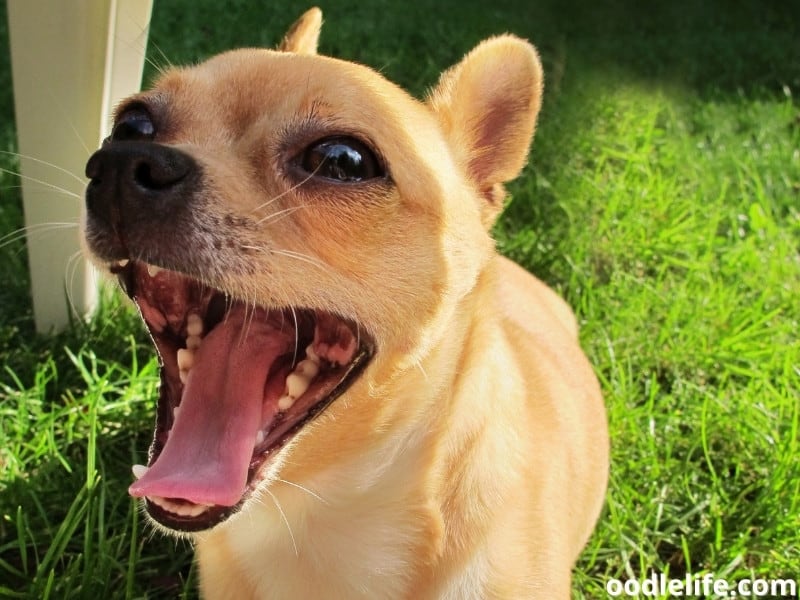
Firstly, inspect the tooth. Gently lift your puppy’s lips and take a look at the affected tooth. Assess the level of damage (like a small chip or a major fracture) and look for signs of bleeding or swelling.
Taking a picture may help while consulting with a veterinarian.
Talk to your vet as soon as possible. They will guide you on whether the situation requires immediate attention or can be managed with a scheduled visit. Don’t rely on self-help or online forums, as your vet’s advice is crucial for accurate diagnosis and treatment.
Next, monitor your puppy’s behavior. Changes in their food habits or sensitivity around the mouth may be strong indicators of pain or discomfort. If your little one is in distress, try feeding them soft food or applying a cold compress to the affected area.
While waiting for a vet appointment, maintain oral hygiene. Keep an eye on the injured tooth and make sure it stays clean. If your vet has prescribed any ointments or medications, administer them according to the guidelines.
Finally, prevent further damage. Puppies love to chew on things, so ensure they don’t get their paws on anything that could potentially exacerbate the situation. Swap their hard chew toys for softer alternatives to keep them entertained without risking more harm.
Stick to these steps, and you’ll be putting your best paw forward to handle your puppy’s dental mishap. Their sweet, slobber-filled kisses will be back in no time!
Consulting a Vet
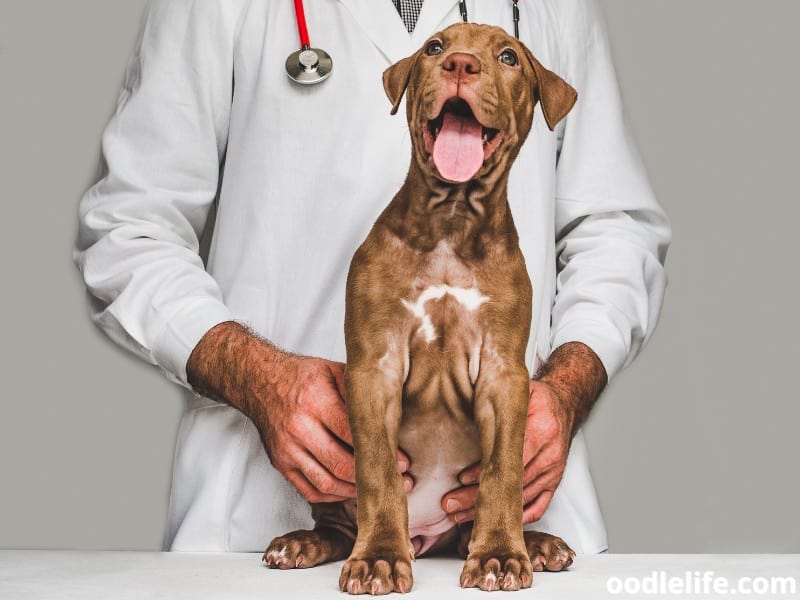
Scheduling an Appointment
It’s important to act promptly if your puppy’s tooth is broken. To address the issue, make sure to schedule an appointment with your veterinarian as soon as possible. This will enable them to assess the severity of the situation and provide appropriate treatment.
Give them a call, explain the issue, and they will guide you on the best time to bring your puppy in.
Remember, a timely visit to the vet can prevent complications and ensure your puppy’s comfort and well-being. Keep an eye on your furry friend until the appointment, making sure they aren’t in distress and are not trying to chew on anything that could worsen the condition.
Communicating the Issue
Once at the veterinarian’s office, clearly communicate what happened and any symptoms or behavior changes you may have noticed. This will help the vet to better diagnose and treat the problem. Use simple language and be specific about the details, such as:
- When the tooth broke
- How you noticed it
- Any changes in your puppy’s eating or drinking habits
- If your puppy appears to be in pain
With this information, the vet will be better equipped to assess the situation and recommend the best course of action for your puppy.
Your vet may suggest treatments like tooth extraction, capping, or repairing the tooth, depending on the severity of the break. Rest assured, your furry friend will soon be on the road to recovery with the help of a knowledgeable and confident veterinarian.
Care for Broken Puppy Tooth
Diet Adjustments
When your puppy has a broken tooth, their diet will need some adjustments. Keep their mouths comfortable by softening the food. You can use warm water or low-sodium chicken broth to dampen the kibble.
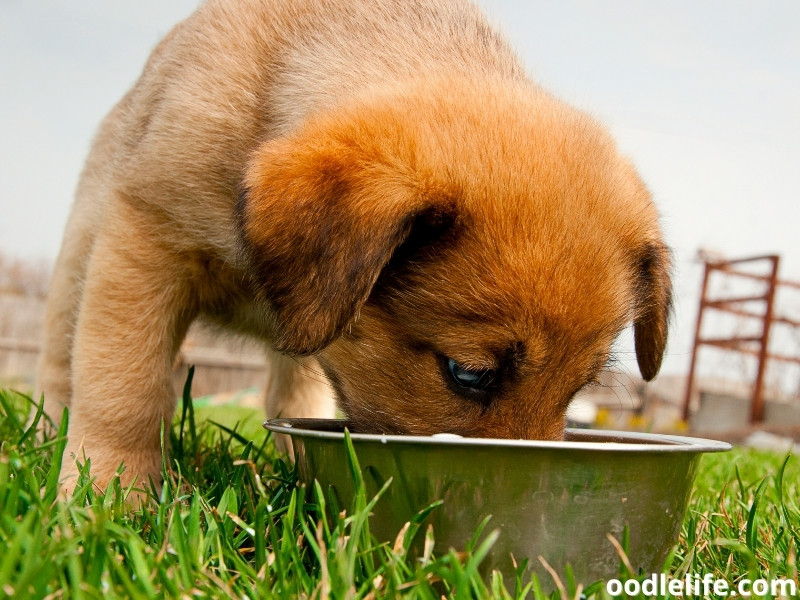
This will make it easier to chew and avoid putting pressure on the sensitive tooth.
Give them soft treats like plain canned pumpkin or mashed sweet potatoes. Avoid offering them hard, crunchy treats to prevent further damage to the tooth.
Teeth Cleaning
Proper dental hygiene is essential when your puppy has a broken tooth.
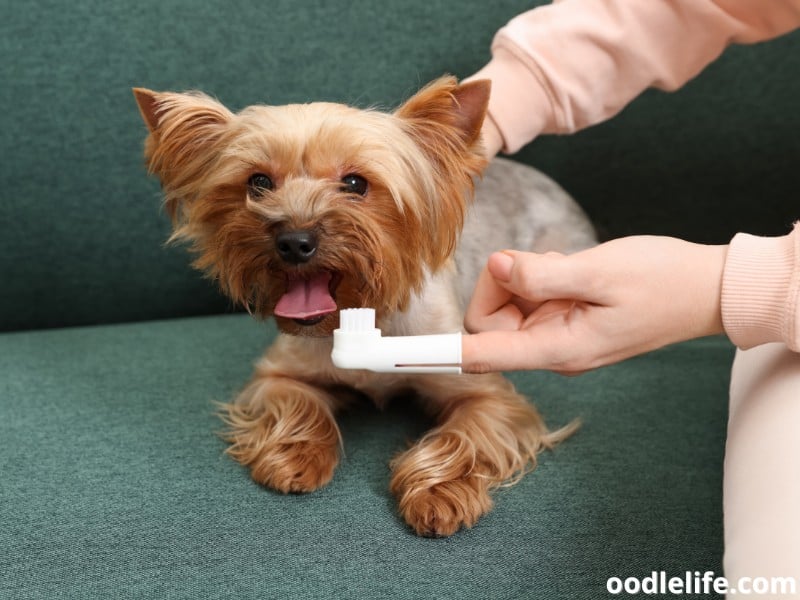
Here’s a step-by-step guide for cleaning your puppy’s teeth:
- Buy a toothbrush and toothpaste specifically for dogs. Ordinary human toothbrushes and toothpaste contain ingredients that can harm dogs.
- Introduce the toothbrush slowly. Show your puppy the brush and let them sniff and investigate before trying to use it.
- Apply a small amount of toothpaste on the toothbrush; remember, a little goes a long way for your pup.
- Use short, gentle strokes. Brush the teeth, focusing on the broken tooth, and be extra gentle to avoid causing pain.
- Clean both upper and lower teeth. Pay special attention to their gumlines, where plaque and bacteria build-up can occur.
- Reward your puppy after brushing. Praise them for being cooperative during the process, and offer a soft treat for reinforcing good behavior.
It’s crucial to clean your puppy’s teeth daily in these circumstances, and monitor their mouth for any signs of infection or discomfort. If the issue persists, consult your veterinarian to determine the most suitable course of action.
Preventing Tooth Breakage in Puppies
Proper Chewing Toys
Choosing the right toys for your puppy is essential for preventing tooth breakage. Puppies love to chew, so providing them with appropriate toys can not only save your shoes but also keep their teeth healthy. Opt for toys made of durable, non-toxic materials like rubber or nylon.
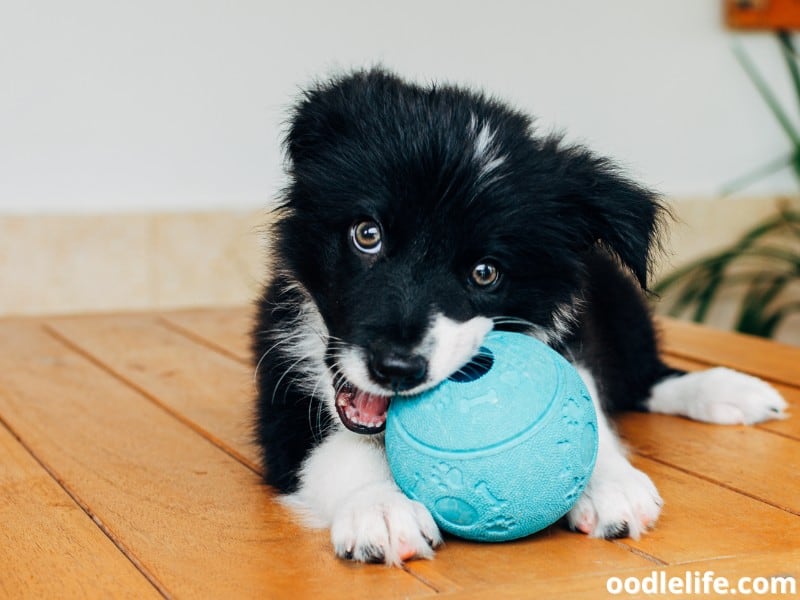
For example, consider getting a Kong toy, which is designed to withstand rigorous chewing and can also be stuffed with treats to keep your pup’s interest. Avoid toys that are too hard, as they can put too much pressure on your puppy’s teeth, leading to breakage. If you’re unsure about a toy’s safety, you can always consult with your vet for recommendations.
Regular Dental Check-Ups
Just as you visit the dentist for regular check-ups, you should also bring your puppy to the vet for dental examinations. Catching potential tooth issues early on can prevent more serious problems in the future and ensure your pet’s overall health.
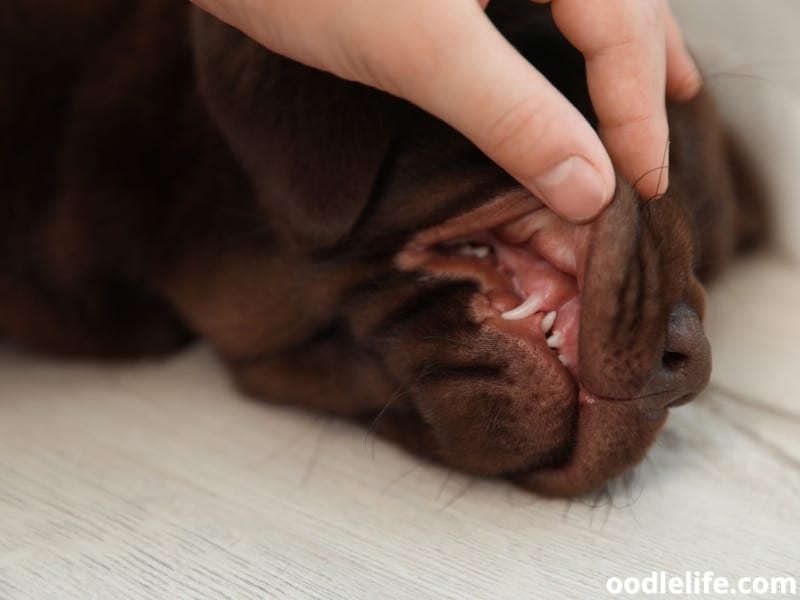
Whether it’s a routine visit or something more specific like addressing bad breath, your veterinarian will check for signs of dental disease, broken teeth, and potential gum infections. While you’re there, ask your vet about at-home dental care tips and tricks to keep your puppy’s teeth healthy between check-ups.
By providing suitable chew toys and scheduling regular dental appointments, you’re taking the right steps to prevent tooth breakage in your puppy. Remember, a healthy mouth is crucial for your four-legged friend’s overall well-being!